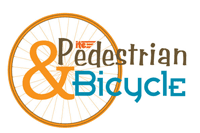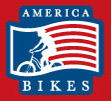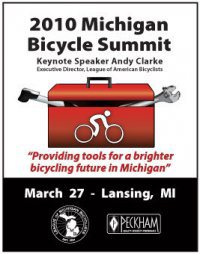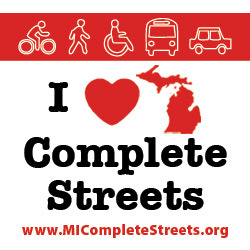You are currently browsing the monthly archive for March 2010.

Click graphic to learn more about the Institute of Transportation Engineers Pedestrian & Bicycle Council
At the 2009 ITE Annual Meeting in San Antonio, the last panel of the last day focused on pedestrian safety, with a presentation by Meghan Mitman on recent crosswalk research and another by me on potential changes to the vehicle code, driver’s manual and Manual on Uniform Traffic Control Devices (MUTCD) to improve driver and pedestrian comprehension of crosswalk right of way.
Research performed by Meghan with David Ragland and Charlie Zegeer in the early part of the 2000s revealed a very troubling phenomenon related to a basic understanding of who has the legal right of way at uncontrolled crosswalks. Their research focused on California, where the California Vehicle Code requires that drivers yield to pedestrians at crosswalks and defines crosswalks as an extension of a sidewalk across an intersection, regardless of whether it is marked. Their research shows that the more complex the intersection, the less comprehension there is among drivers and pedestrians about who has the legal right of way: At intersections where all legs are marked, comprehension was greatest; and at intersections where no crosswalks are marked, comprehension is the worst with nearly half of drivers not understanding that they are legally required to yield the right of way to pedestrians. Read the rest of this entry »
Michigan Complete Streets Coalition Co-Chair John Lindenmayer with USDOT Secretary Ray LaHood and Sarah Schillio, Legislative Director for Michigan State Representative Lee Gonzales at the 2010 National Bicycle Summit.
Last week’s National Bicycle Summit brought 13 Michigan cycling advocates to Washington DC. to lobby for congressional support complete streets. The Michigan Complete Streets Coalition (MCSC) was well represented in the Michigan Delegation with representatives from the League of Michigan Bicyclists, American Cycle & Fitness, Wheelhouse Detroit, Michigan Trails and Greenways Alliance and PEAC. The Michigan delegation did an amazing job advocating for complete streets during our visits with Senators Levin and Stabenow and all 15 Michigan Representatives.The MCSC would like to also thank all the Michigan advocates who participated in LMB’s Virtual Lobby Day, supporting our face to face meetings with phone calls from back home.
The Michigan Complete Streets Coalition is pleased to report that today the MDOT budget passed out the House Transportation Subcommittee on Appropriations. The budget passed on a 5 to 3 vote and includes notable boilerplate complete streets language including a provision that the department shall give preference to enhancement grant applicants that have adopted complete streets policies.
The inclusion of complete streets language was recommended by Representative Switalski and was included in Chairman Gonzales’ recommendations to the Committee. We would like to thank Representative Switalski and Gonzales for their continued leadership on instituting complete streets in Michigan.
In addition, this bill also adds a new subsection to encourage MDOT to work with Amtrak to facilitate passengers traveling with bicycles.
The transportation budget will now go to the full Appropriations Committee for a vote before heading to the House floor later this Spring.
The Complete Streets language included in the Transportation Budget is below.
Sec. 321. In evaluating and awarding enhancement grants, the department shall give preference to applicants which have adopted complete streets policies. In addition, the department shall give preference to enhancement grant applications which further complete streets policy objectives. The department shall report to the House and Senate Appropriations Subcommittees on Transportation, and the House and Senate Fiscal Agencies, on or before March 1, 2011, on the specific actions taken to comply with the intent of this section.
Michigan Department of Transportation has received training funds for Michigan to support Bicycle and Pedestrian Safety as well as encourage bicycling and walking through FHWA.
Communities can apply to host these community/regional training courses with the obvious benefit of having your local streets being critiqued by experts to make them more walkable, bikeable and ADA compliant. These courses support a diverse array of current local, state and national efforts including healthy livable communities, complete streets, context sensitive solutions, sustainable communities; just to name a few.
Click the Read More link below for a description of the three training courses your community is eligible to host or to send participates to. The training interest application is due March 25, 2010. Inquires can be made to Cindy Krupp [email protected] or Deb Wedley [email protected].
 Just posting a friendly reminder as a follow-up on our post from last week regarding tomorrow’s Virtual Lobby Day in support of the Active Community Transportation Act, H.R.4722. Tomorrow the League of Michigan Bicyclists is leading a delegation of 13 Michigan cycling advocates to lobby for Complete Streets and more funding and federal support for bicycling in Michigan. We have a full day of meetings scheduled with Michigan Congresspeople and are asking you to back up our face to face efforts with phone calls from back home. Specifically, please help us generate support for H.R. 4722 (Act Act).
Just posting a friendly reminder as a follow-up on our post from last week regarding tomorrow’s Virtual Lobby Day in support of the Active Community Transportation Act, H.R.4722. Tomorrow the League of Michigan Bicyclists is leading a delegation of 13 Michigan cycling advocates to lobby for Complete Streets and more funding and federal support for bicycling in Michigan. We have a full day of meetings scheduled with Michigan Congresspeople and are asking you to back up our face to face efforts with phone calls from back home. Specifically, please help us generate support for H.R. 4722 (Act Act).
Learn more about the ACT Act here.
Download Issue Paper on ACT Act (and Complete Streets Bill) here.
TAKE ACTION
For those Michigan complete streets advocates not attending the National Bike Summit in Washington, DC, please participate in the Virtual Lobby Day on Thursday March 11. In conjunction with the National Bike Summit we ask that you call your representative at the same time that over 700 Summit participants will have in-person meetings in congressional offices. The combination of face to face and phone communications in support of this bill will demonstrate a strong and unified Michigan voice next week on Capitol Hill. The Virtual Lobby Day is being organized by our cycling friends at America Bikes.
We encourage you to use the talking points below to send your own alert encouraging your members to participate.
TALKING POINTS
Please call your representatives on March 11th to ask them to co-sponsor H.R.4722: “The Active Community Transportation Act.” Tell them:
- Bicycling and walking are part of the solution. Half of all trips in the United States are three miles or less, yet the majority of these short trips are made by car. Shifting more of these short trips to biking and walking would not only reduce congestion, air pollution, greenhouse gas emissions, and our dependence on oil, but will also improve physical activity, safety, and livability.
- Investing in bicycling and walking infrastructure works. Commuting by bicycle has increased 43 percent since 2000 - and by 69 percent in designated Bicycle Friendly Communities that have invested in infrastructure improvements.
- Please co-sponsor the Active Community Transportation Act (H.R.4722).
Here are the phone numbers for all the Michigan Congress people:
- Senator Carl Levin (D- MI) 202-224-6221
- Senator Debbie Stabenow (D- MI) 202-224-4822
- Representative Bart Stupak (D - 01) 202-225-4735
- Representative Pete Hoekstra (R - 02) 202-225-4401
- Representative Vern Ehlers (R - 03) 202-225-3831
- Representative Dave Camp (R - 04) 202-225-3561
- Representative Dale E. Kildee (D - 05) 202-225-3611
- Representative Fred Upton (R - 06) 202-225-3761
- Representative Mark Schauer (D - 07) 202-225-6276
- Representative Mike Rogers (R - 08) 202-225-4872
- Representative Gary Peters (D - 09) 202-225-5802
- Representative Candice Miller (R - 10) 202-225-2106
- Representative Thaddeus McCotter (R - 11) 202-225-8171
- Representative Sandy Levin (D - 12) 202-225-4961
- Representative Carolyn Kilpatrick (D - 13) 202-225-2261
- Representative John Conyers, Jr. (D - 14) 202-225-5126
- Representative John D. Dingell (D - 15) 202-225-4071
Don’t know who your Congressperson is? Visit http://capwiz.com/lab/home/ and enter your address to find out.
 March 27th - 11:00 - 11:45am
March 27th - 11:00 - 11:45am
In the past year many exciting developments have occurred around Complete Streets in Michigan. A panel discussion at the 2010 Michigan Bicycle Summit will provide updates on these developments and provide suggestions on ways your community can go about adopting your own Complete Streets policy.
More Details/Registration:
http://www.lmb.org/index.php/events/mi-bike-summit.html
 Please help us promote the Michigan Complete Streets Coalition by putting one of our badges on your website or blog. Our Promotions Page has various graphics, as well as information on how to show your support for MCSC on on your Facebook page.
Please help us promote the Michigan Complete Streets Coalition by putting one of our badges on your website or blog. Our Promotions Page has various graphics, as well as information on how to show your support for MCSC on on your Facebook page.
Please reserve the “member” badges for Coalition partners. If you have not yet signed-on as an official coalition partner, you may do so here.
 Representative Earl Blumenauer just introduced the Active Community Transportation Act, H.R.4722. This groundbreaking bill creates a competitive grant program with $2 billion to help communities build bicycling and walking networks. For the first time, communities would be able to compete for multi-year funding to build active transportation systems, just as they do for transit and road infrastructure.
Representative Earl Blumenauer just introduced the Active Community Transportation Act, H.R.4722. This groundbreaking bill creates a competitive grant program with $2 billion to help communities build bicycling and walking networks. For the first time, communities would be able to compete for multi-year funding to build active transportation systems, just as they do for transit and road infrastructure.
“Too often we take for granted the value of being able to bike and walk to work,” said Blumenauer. “It’s unfortunate that many communities don’t have the infrastructure in place to make active and healthy forms of transportation more accessible. The ACT transportation grants will make it easier for people to get out of their vehicles and onto sidewalks or bikes, boosting both heart rates and community vitality.”
 Wednesday, March 31, 2010
Wednesday, March 31, 2010
8:30 a.m.-5 p.m.
(Registration begins at 8 a.m.)
Location
SEMCOG Offices
535 Griswold St., Ste. 300
Detroit, MI
Register Now
Objective
This workshop will provide local government engineers and planners responsible for designing public rights-of-way and recreational facilities, and ADA coordinators, with information about federal regulations pertaining to public rights-of-way and outdoor developed areas.
Read the rest of this entry »
 This article originally appeared in the AARP Bulletin Today on March 1, 2010.
This article originally appeared in the AARP Bulletin Today on March 1, 2010.
Can pedestrians, cyclists and automobiles share safe streets?
Cyclists and walkers won a major victory in Lansing last year. After thousands of citizens petitioned for a ballot initiative, the Lansing city council agreed to invest about $400,000 a year to make streets safer for non-motorists.
As a next step, volunteers will conduct walkability surveys to identify areas that need work. Kafantaris said she is looking for volunteers for the Lansing survey and is building a network of activists in other cities. To join the effort, e-mail [email protected].
Elsewhere in the state: A group called Safe and Active Genesee for Everyone is pushing for a more accessible transportation network. Traverse City’s new infrastructure strategy emphasizes sidewalks and bike lanes. Marquette narrowed a downtown portion of Wright Street from four lanes to two with a center lane and four-foot bike lanes on both sides.
At the state level, lawmakers approved a 2009-10 budget last year that encourages the Department of Transportation to adopt complete streets policies and assist local governments in doing the same. Supporters hope the legislature will enact stronger legislation this year.















